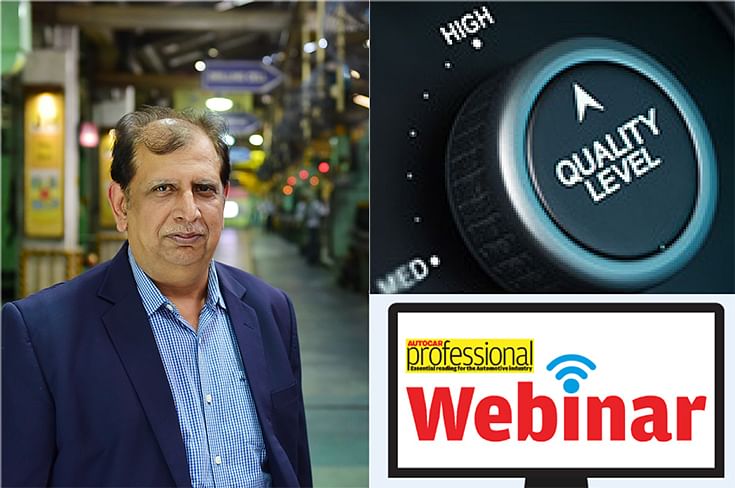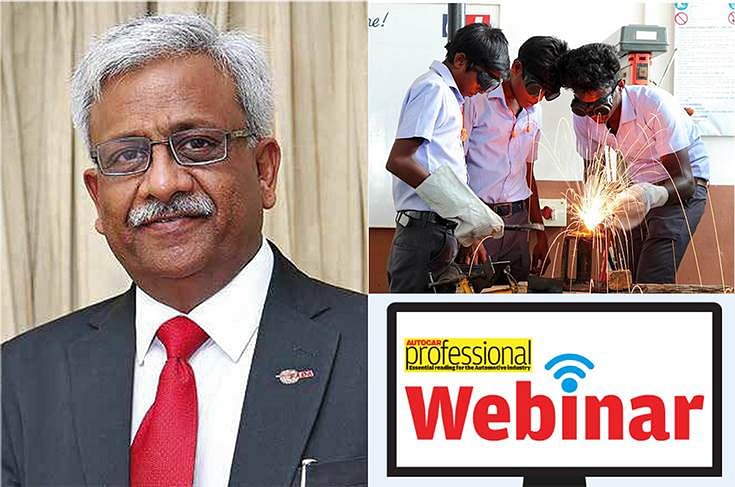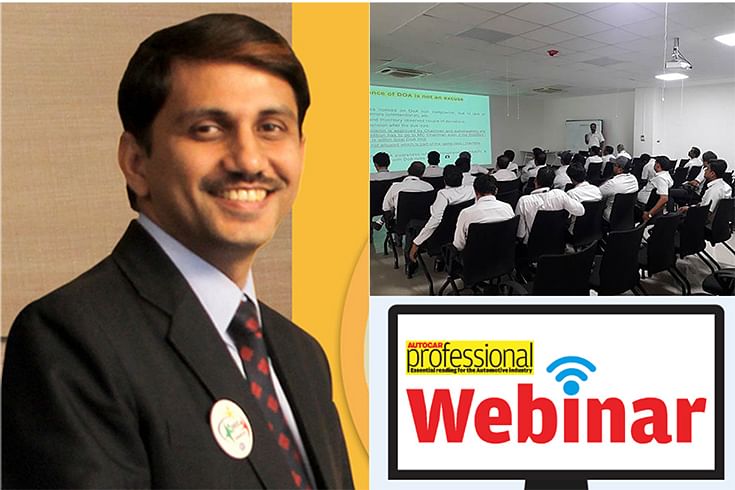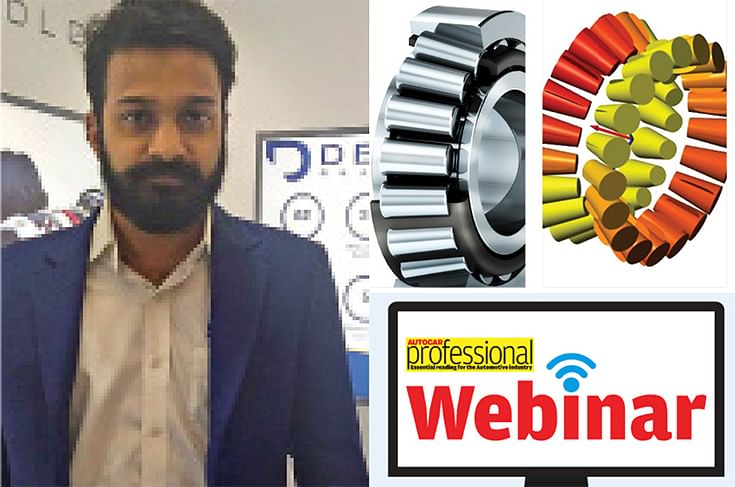Digitalisation, multitasking the new norm for India Auto Inc: Experts at Labour Day webinar
Autocar Professional's webinar on 'Manufacturing and Skilling after Covid-19' sees 5 industry experts come up with a number of insights and suggestions on how OEMs and suppliers can restart operations and become future-ready.
The global lockdown has weighed heavy on industries worldwide, but for mankind this is one among the many challenges that has united people across borders to stand and fight the Covid-19 pandemic. May 1 marks a special day for the vast majority in the automotive and allied sectors as also general industry. Recognised as International Labour Day, it celebrates the working class and its humongous effort. In India, this year marks the 96th anniversary after the first celebration of Labour Day held in 1923 in what was then Madras (Chennai).
It is no secret that the ongoing impact of Covid-19 has brought forth the topic of social distancing norms, which will also force organisations to re-arrange, relook and re-plan their manufacturing processes that may also require new skills. On the other hand, even if restrictions were to lift, significant preparations will need to be done by companies to resume operations in a manner that’s leaner and more efficient. An organisation’s team, across the board, will have to labour hard to come up with new ideas to do the same old things, in a better way or a smarter way.
In fact, a report released by the International Labour Organisaiton (ILO) a few days ago, has it that as job losses escalate, nearly half of the global workforce is at risk of losing their livelihood. The report adds that "workplace closures have an immediate and severe impact on enterprise" and own-account workers’ current operations and leave them at high risk of insolvency. Even once containment measures are lifted, surviving enterprises and own-account workers will continue to face challenges given that recovery is expected to be uncertain and slow. For those engaged in global supply chains, disruptions are likely along forward and backward linkages of the chain as other countries continue to face reductions in economic activity. Restarting businesses will require significant adjustments with cost implications, including securing safe work environments. Unless tackled by effective policies, these new requirements are likely to put a severe constraint on businesses.’
As part of our endeavour and sharpened focus on the automotive industry, Autocar Professional hosted a webinar with the overriding theme of ‘Manufacturing and Skilling after Covid-19’ on May 1. The webinar had all of five top-level panelists comprising the head of a quality circle of a leading Indian OEM; a well-known analyst from a research organisation; the chairman of a skill development organisation; the head of a global lighting supplier in India and the managing director of a medium-sized component manufacturer. There was also a healthcare professional to share inputs relevant for current times.
The five panelists were:
- Vijay Kalra, Head, Mahindra Institute of Quality and Ex-Chief of Manufacturing Operations- Automotive Division, Mahindra & Mahindra.
- Ashim Sharma, Partner & Group Head - Business Performance Improvement (Auto, Engineering & Logistics), Nomura Research Institute
- Nikunj Sanghi, Chairman, ASDC (Automotive Skills Development Council).
- Ramashankar Pandey, Managing Director, Hella India Lighting
- Rohan Rathod, Managing Director, Delux Bearings
The webinar, which opened at 11am and went on till nearly 2pm, was moderated by Sumantra B Barooah, Executive Editor, Autocar Professional, and provided plenty of takeaways for industry stakeholders to face and overcome the many challenges that the Covid-19 outbreak and the subsequent lockdown has brought upon India Auto Inc.
Here's taking a closer look at what each panelist said and their observations and suggestions to be future-ready in what looks to be a future of continual disruptions.

Vijay Kalra: 'Covid-19 has presented the biggest opportunity for organisations and India.'
May 1 was a red-letter day for industry veteran Vijay Kalra, who only recently retired from his position as Chief of Manufacturing Operations, Automotive Division, Mahindra & Mahindra and has moved on to head a new operation at the same OEM. The Autocar Professional webinar marked his first representation as Head of the Mahindra Institute of Quality, wherein he shared insights and experience on what goes behind making a vehicle.
“Whenever we look at manufacturing operations, we look at a stable environment. I believe that it is the best way to deliver numbers, timing, quality and cost. At present, we are in a difficult situation and are not sure how things will move tomorrow. Whenever operations restart, there will be a huge change, we will have to recalibrate our capacities as the demand cycle will change, customers choices will be different,” asserted Kalra.
He said that Mahindra & Mahindra too has released its own guidelines on how manufacturing will resume, taking into account inputs from the WHO (World Health Organisation), India’s Ministry of Home Affairs, State administrative authoritiess and others. This is a scenario followed by other OEMs and component suppliers too. Expressing concern as to how restarting the machines at factories will need to be first inspected and checked to ensure that they do not break down, he said: “We assume things can go wrong, so expect more failures. We will need to need to try and fix it before restarting operations, that’s the biggest challenge we have,” said Kalra.
He said that the company has already thought of using various protective gear for workers to ensure their safety. “There will be absolute change in teams that were working on shopfloors, which is the biggest change we should worry about. Another worry is that the stop (manufacturing) was abrupt; we are used to planned (well-though-of) factory shutdown for which critical processes are followed. This will be a situation where many things will be unknown.”
Kalra said that in the pre-Covid-19 world, there was a clear layout of shopfloor practices and responsibilities. “Now cycle times will become longer, if somebody was operating one machine earlier, they may need to manage multiple. Change in SOPs, re-layout of shopfloor if required, and major training and manufacturing dexterity will be the focus. When we left (shutdown), we had a rhythm of workflow, now the whole system will be different. We may start with less numbers maybe one-tenth of what we were doing,” explained Kalra.
According to Kalra there will also be need for OEMs to work closely with their component suppliers to see their manpower situation, readiness, critical processes, and in fact may need to revalidate everything. Measuring every first part and seeing if some parts need retrial are some of the steps that OEMs will need to take. "A big challenge is what happens to Tier 2 and 3 suppliers; it will be very difficult to gauge," said Kalra.
“Manufacturing is like a relay race. Everyone needs to be in sync or else it will be challenging.
Maybe after sometime, we will need to pay a price for Covid-19. I hope it will not be huge, but on the other hand we need to grab most of the new big opportunity to prove ourselves. This is the biggest opportunity for organisations and the country,” concluded Kalra.

Ashim Sharma: 'Expect continual disruptions across the automotive supply chain.'
Nomura Research Institute's Ashim Sharma, a well-known speaker in auto industry conclave, kicked off the webinar by setting up the context with regard to the 'new normal' in a post-Covid scenario where 'social distancing' will be de rigeur.
The new normal
"While there are a lot of different predictions, nothing is certain in the post-Covid scenario other than the fact that people are going to see a huge change in their daily lives. The new normal means industry should expect continual disruptions across the automotive supply chain," said Sharma.
The industry expert and analyst added that going forward, there will be challenges such as a change in consumer behaviour in lieu of risk aversion due to economic distress, disruptions in supply chain due to 'chokes' at different nodes and a significant impact on production due to the unavailability and shortage of material and workforce due to reverse migration in the short-term.
With a vaccine for the coronavirus still under research phases, the risk of a community spread will remain in the coming months until a possible cure for the Covid-19 is forthcoming. So, the resumption of industrial operations will only come at the behest of companies ensuring strict guidelines restricting intermingling of employees and shopfloor workers inside factories.
According to Sharma, "There will be mandatory social distancing norms including at the shopfloor which will be crucial for reducing human interfaces to minimise the risk of contact and spread of the coronavirus."
"Contact tracing is also going to be important and that is why the industry should expect greater supply chain digitisation," he further added.
Sharma explained that while some of the larger companies were able to retain the manpower by paying advanced payments, the same does not hold true with smaller companies. So, labour shortage at the outset will lead to productivity losses.
Need for greater automation
Citing the possible solutions, he said, "On the shopfloor, a lot of changes will need to be done including planning and availability of manpower and components. Use of digital tools will drive the productivity to its maximum during these times of limited workforce.
"There will be additional checklists before start of operations and redefinition of the standard operating procedures in the manufacturing industry," pointed out Sharma.
"Also, the Japanese concept of 'Jidoka' or automation will gain more relevance in Tier 2 and Tier 3 organisations with social distancing norms calling for less congestion on the shopfloor and thus the need for a single operator to manage multiple machines" he added.
However, bringing out the money for investment into automation is going to be a huge challenge, according to Sharma.
Some other factors that would directly affect the productivity on the shopfloor include logistics and the supply chain wherein due to the industry's high dependence on road transportation, unavailability of truck drivers who have gone back home, will lead to troubles in material inflow. Moreover, restriction on movement of goods and inability to open warehouses in lock-down zones will also be hindrances in smooth operations. People going into these zones will need to be given PPEs for ensuring their health.
While companies are grappling with financial challenges in terms of the revenues drying up due to the nationwide lock-down in place, Sharma stressed upon the empathetic need for organisations to support their staffers in this hour of crisis. "Not only shopfloor workers who work in plants but also their family members and relatives who work in other industries need to be taken care of," remarked Sharma.
Transformation across operations
Shedding light on the sales and aftersales front, Sharma mentioned that there will be substantial changes in dealership footfalls. Sales promotion and customer engagement activities will change in rural and urban areas and there will be operational difficulties due to reduced manpower.
"There will be dynamic changes in dealership SOPs with customers no longer being pushed for test drives at the showrooms and service centres focusing more on extensive sanitisation of vehicles before and after the work is done," said Sharma.
Talking about the possible solutions to address each of these problem areas across the different places of the supply chain, Sharma gave his viewpoints to restart operations in a post-Covid scenario.
In terms of worker safety, he pointed out that automakers can focus on in-plant stay of local assembly line associates and improve high levels of sanitisation practices to ensure health safety. Extensive health screening for people coming in and maintaining quarantine guidelines to minimise the chances of the spread of the disease inside the plant premises.
As regards shopfloor safety, the suggestions involved dynamic planning of manpower and material, use of digital tools to gain maximum operations possible and developing protective cells for assembly shops, alongside staggering of worker shifts with zero contact of people between two shifts.
Sharma also suggested reconfiguration of the plant infrastructure and machinery to bring in additional parts from suppliers and reduce dependency on external sources.
A radical transformation would come in the form of low-cost automation with companies needing to collaborate with startups to automate back-end operations such as purchase order creation, invoice payment and material handling.
Furthermore, Sharma touched upon the implementation of IoT solutions for tracking and tracing of not just components but also people who might have contracted the disease.
He indicated the transformation of the logistics industry due to digitisation and that Covid-19 will force a lot of consolidation in the sector. On the other end, demand might just spur for more high-end, comfortable trucks for long journeys. Also, remote servicing in a larger radius and provisioning of spares across arterial highways will boost truckers' confidence.
At the showroom level too, there will be tremendous strengthening of digitisation and online presence to make up for the lack of contact and that the industry should expect new investment in dealership infrastructure to enable social distancing and sanitisation. Doorstep delivery of new vehicles may become a popular concept going forward, according to Sharma.
Sharma brought the focus on the need for greater localisation and that for India Auto Inc to become self-reliant, the industry must focus on net localisation rather than gross localisation and that some changes in policy will go a long way in enhancing self sufficiency. "The thinking across India Auto Inc needs to change from net localisation to gross localisation. The paradigm is going to shift to how resilient are our supply chains, so that disruptions are fewer going forward."
Sharma summed up his address by pointing out that reskilling across all functions including R&D, logistics, procurement, manufacturing and sales, marketing and aftersales is required to ensure that the workforce is ready to navigate through the new normal.

ASDC's Nikunj Sanghi: “Online learning and training now vital across manufacturing, sales, aftersales.'
Speaking at Autocar Professional's Labour Day Webinar, veteran automotive dealer and President, Automotive Skills Development Council (ASDC), begin his presentation with an interesting thought on why we cannot celebrate May 1 as Workers Day or Skilling Day, and not Labour Day, which is simply giving the much-deserved respect to the profession. He said that the sheer global impact that Covid-19 has had was unimaginable and looks straight out of a sci-fi movie.
The industry veteran says that while face-to-face interactions will become fewer, a positive development will happen on to the ones at the bottom of the pyramid. Digitalisation will filter in there, which will require reskilling to use the tools of the trade. This probably wouldn’t have happened if Covid-19 hadn’t disrupted the norm.
Digital-first approach for auto dealerships
Social distancing will bring dynamic change to the dealership business, said Sanghi. No longer will customers feel comfortable walking into showrooms. Now, the reverse will happen and OEMs and dealers will have to reach out to customers even more. And going digital will help them do just that.
Sales channels, dealers and OEMs per se will have to increase the transparency level dramatically. That's because customers will now prefer to engage with them virtually which in turn means there has to be digitally. Sanghi said that experiences like test drives of new cars, which has been a very popular method of selling a passenger vehicle, will be a much-less-used tool for sales. Likewise, physical inspection of vehicles undergoing maintenance will take a backseat and the OEM/dealer will have to convey images to customers about the work being done, either in real-time or in some other manner.
Sanghi said that the pandemic has brought forth the concept of Work From Home to enable social distancing, which earlier would never have been thought would be possible for a vast majority of the jobs. “You will need to train them (workforce) on how to use digital tools, and train the entire ecosystem to monitor the efficiency. The need for top-notch cybersecurity is vital; one has to be absolutely sure that the data is secured and not misused. Data integrity needs to be 100 percent. Organisations will need to upskill existing staff to be digital and tech-savy. All the while, the focus has to be on the data which is supposed to be the oil of the economy, that is secured and owned by the owner, and not someone else,” said Sanghi.
Coming to the servicing part, Sanghi believes that technicians will need to be trained on ensuring safety measures like sanitising of vehicles and contactless delivery to ensure complete peace-of-mind as well as health safety of people involved.

Ramashankar Pandey: 'States must compete not on investment but on employment.'
One of the youngest corporate heads in the Indian automotive industry and a leading road safety crusader, Ramashankar Pandey, Managing Director of Hella India Lighting, made an insightful presentatio. He spoke on the various aspects around the impact of Covid-19 on organisations and its workforce. “We are surrounded by unprecedented uncertainties. We have succeeded in the initial phase, despite the ailing health system for majority of its population. We might be winning the war against corona but is going to be a long battle.”
He agreed that the ongoing lockdown is a big jolt to the economy and the manufacturing sector, as the supply chain is completely broken. According to Pandey, each one of us has a personal, professional and rational responsibility in this fight against Covid-19, and no one by themselves alone can win the fight. He agreed that that the present situation is quite challenging, especially the broken finances for MSMEs (Tier 2s and 3s), which poses a huge risk of extreme poverty and the likelihood of creating unrest.
On the other hand, he asserted that while the “India has many challenges, the fear psychosis of the unknown, the collective wisdom is travelling faster than the virus. All stakeholders are coming together, the global action is fully justified, but the fear is not. We are doing whatever we can, compared to deaths per day worldwide due to road accidents, Covid-19 is very less. Given the extreme measures by all nations and global prioritisation, the fear may be overproportional compared to other bigger killers. Every CEO, management and stakeholder is doing what is humanly possible.”
"The post-Covid challenge ahead of India Auto Inc is immense. This is right from logistics for manufacturing plants resuming operations, workers returning to the shopfloor and revival of demand. But there are positives too in the form of new SOPs."
Man-machine collaboration to drive productivity
He said that there is a big change happening because of digitalisation and Covid-19 has just helped increase the focus. Pandey believes that while the topic may have missed the attention for masses, the current lockdown has brought the focus on skilling and digitalisation into sharp focus.
According to him, smart industrialisation is here to say, and one can simply look at their people's daily lives, particuarly in urban and some parts of rural India, to experience that they are now more reliant on digital tools, then they were in pre-Covid-19 days.
For the manufacturing sector, it means moving from labour-intensive methodologies to automation. According to Pandey, the meaning of lockdown changes based on income groups and financial security. Trust and respect is a huge capital, because of the highly skewed income distribution and respect allocation in society. Focusing on the potential future, he asked what kind of education does India need to focus on?
The answer is everything. “When the people are not skilled or not educated, they remain vulnerable. The worst is that we cannot pay them more (lower class), our productivity is the lowest in the world. The policy of life will come that “You are, therefore I am”. Perform ‘ghar wapasi’ on productivity. The vision of our industrial policy needs to focus on fair wealth distribution. States must now compete not on how much investment has come but how much employment has been generated. The skill robbery happening in the country needs to be fixed,” commented Pandey.
"Covid has accelerated the growth of the cyber-physical world. India should marry man with machine to enhance productivity. Highly skewed income distribution and a lack of respect for labour remain a big concern. Lack of respect leads to lowered productivity and efficiency, which serve to robs India of a competitive edge."

Rohan Rathod: 'Adopt lean management tools to be future-ready.'
Rohan Rathod, who heads Delux Bearings, the Mumbai-based manufacturer of clutch release bearings, ball bearings, pulleys and steering column bearings, brought an MSME (Medium & Small Scale Enterprises) perspective to the whole scenario. MSMEs are critical to the overall functioning of the automotive supply chain and also the most impacted in the current industry lockdown phase. Rathod is also one of the few in India who have made a soft start of their manufacturing facilities, as permitted by the local authorities. He shared his views and course of actions in ensuring the safety of his employees at the company facility and above all, the course of action towards sustained operations.
Lean management to be fit and future-ready
Speaking on some solutions that could be incorporated by the MSME sector in India, Rathod suggested some towards a gradual restart of an organisation. Among his many suggestions, he stressed on gathering and compiling as much data as possible on the pre-lockdown position, allocating the first few days for FY2020 book closure activity and revising worker manuals while also making sure that new heightened safety standards do not add more load to the already stressed financial condition of an organisation.
Lean manufacturing or the art of slashing waste, which customers are not willing to pay for, Lean manufacturing is all about minimalising waste within production and manufacturing systems while maximising productivity. It is based on several principles like the Japanese kaizen or continuous improvement. Among the many benefits derived by employing lean management methodologies include reduced lead times, reduced operating costs and improved product quality, all of which pay rich dividends to companies.
This approach is best defined in the famed Toyota Production System, which is now used the world over by both automotive and companies in other sectors. A recent example of successful lean management is the Toyota Production System being successfully deployed at Bangalore-based automotive springs manufacturer Stumpp Schuele & Somappa Springs to speedily ramp up production of face shields from 275 units a day to 5,500, which marks a massive 1,900 percent increase. And the new target is 10,000 face shields a day.
It is just these benefits from lean management that the young managing director of Delux Bearings is targeting. He said, ''While social distancing is the new norm, it should not violate the lean manufacturing norm. Re-use everything. We have a Re-Use Centre and have SOPs to reduce costs. Online learning, cloud-based training and listening are new people growth mantras."
Transparency matters even more now
Rathod also conveyed his concern for a proper communication stream with customers, company vendors as well as employees. "Complete honesty needs to prevail towards the employees in terms of the company's current financial positions, which would invariably boost their morale. In the post-Covid era, there is a need for companies to find the right balance between automation and employment because people's lives are involved."
He also spoke about the need to sensitise employees in a post-Covid work scenario. "In a post-Covid world, it is important for companies to sanitise but also sensitise. Sensitising the workforce is important. Do not take it for granted that the SOPs will be enough. Have Covid patrol teams and re-educate personnel.How about bringing error-proofing to hygiene practices? Companies should think about this in their own specific manner."
Being one of the few companies to restart operations, Rathod said that in the current scenario, it is much cheaper to run hand-to-mouth level of production than buffering stocks. This way he proposes to create new profit centres by offering excess capacity to others. Everyone should revalue the stream map to reduce production cost and take trials to reduce stocks.
From the past 30 days of lockdown, the entrepreneur has discovered the benefits of digital solutions like Google Suites and other communicating tools. This has further raised the need for fast-tracking of new technological solutions like remote monitoring, Industry 4.0 and acloud-based document management system to enable the workforce to be future-ready.
Rathod predicted that for the next 3-6 months, the industry needs to brace itself for the challenging credit scenario, the cash crunch and more rigid SOPs. "Inter-company learning and collaboration is the path ahead for industry. We have to prepare ourselves for 3-5 months of low production," he signed off on a cautionary note.
Digitalisation becomes the need of the hour
While each panelists shared an ocean of their knowledge, one common theme underlined their views, that Covid-19 has introduced digitalisation as the key to the future. For organisations and the country, this means a huge opportunity to upskill and reskill our workforce using digital tools. This will not only help the country stabilise manufacturing activities, but also help improving the standard of living, that well allows for economic growth. The crucial question remains, will the industry and stakeholders, grab the opportunity or will it be wasted?
Restarting the engine of growth
The webinar, which was originally scheduled for an hour, went on for another 90 minutes, indicative of the interest it also drew from viewers who asked the five panelists a variety of interesting questions related to re-starting operations, the hygiene factor on the shopfloor and even commuting to facilities.
All in all, the five industry eperts were of the consensus that the on-ground situation remains fluid and a lot will have to be done relative to each company's manufacturing and skilling requirements. But what they firmly agreed that in the new manufacturing scenario, where people need to stay at a distance from each other, India Auto Inc will now have to take a close look at digitalisating more operations, making its workforce more digitally connected and also adept at multi-tasking. Easier said that done but whoever said manufacturing vehicles or components was a run-of-the-mill affair?
About five hours after the webinar concluded at 2pm, the government announced that the India lockdown had been been extended to May 17. Which means India Auto Inc, which continues to bear a daily loss of an estimated Rs 2,300 crore a day, will now stare at accumulated losses of Rs 126,500 crore as a result of 55 days of plant shutdown and no vehicle sales.
RELATED ARTICLES
Cosmo First diversifies into paint protection film and ceramic coatings
The Aurangabad, Maharashtra-based packaging materials supplier is leveraging its competencies in plastic films and speci...
JSW MG Motor India confident of selling 1,000 M9 electric MPVs in first year
The 5.2-metre-long, seven-seater luxury electric MPV, which will be locally assembled at the Halol plant in Gujarat, wil...
Modern Automotives targets 25% CAGR in forged components by FY2031, diversifies into e-3Ws
The Tier-1 component supplier of forged components such as connecting rods, crankshafts, tie-rods, and fork bridges to l...






 02 May 2020
02 May 2020
 13748 Views
13748 Views


















 Autocar Professional Bureau
Autocar Professional Bureau




